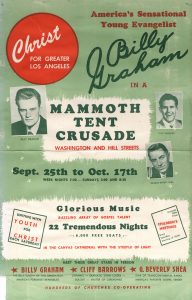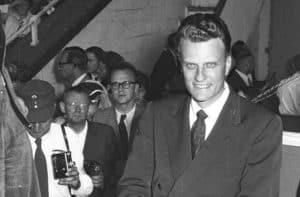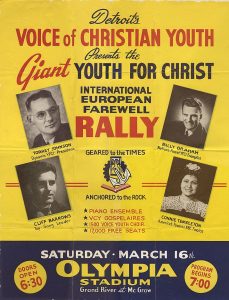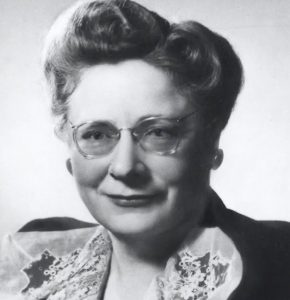As you go through this world with all its storms and its trials…keep your eyes on the Bible, keep your eyes on Christ, and you won’t go wrong. Don’t you follow your feelings. You follow Christ.
—Billy Graham (November 7, 1918–February 21, 2018)—
Key point: God and His Word, the Bible, are absolutely trustworthy. Were we able to ask him, Billy Graham would affirm this reality with clarity and without hesitation. He might even say, “Let me tell you about a crisis of faith in my life that led me to this conclusion.”
Billy Graham’s evangelistic ministry began in 1947. Although the man who would become the world’s best known evangelist had been the preacher at seven evangelistic campaigns prior to the crusade that began in September, 1949 in Los Angeles, it was during the Los Angeles campaign—his eighth—that the press took notice. When it did, Graham was thrust onto the national stage.
Interestingly, the series of meetings held just prior to those in Los Angeles didn’t go well at all, at least not according to human standards. That crusade was held in Altoona, Pennsylvania. On one hand, apathy seemed to prevail, just as it could in any city or town. On the other, various ministries in the area were competing with one another, and squabbles broke out over insignificant issues. Also, the larger religious community was polarized. Altoona was home to several advocates of a strong fundamentalist perspective, and tensions erupted between them and others on the opposite side of the theological spectrum. And as if all that weren’t enough, during one of Graham’s sermons, a woman in the choir with obvious mental problems yelled repeatedly—then she wouldn’t cooperate when members of the evangelistic team tried to calm her down. Billy Graham later wrote that after the services in Altoona, “I pondered whether God had really called me to evangelism after all.”1
 Billy decided not to quit—not yet. Looking ahead to Los Angeles, Graham and his team evaluated the most common criticisms people had offered regarding evangelistic meetings. They took steps to address those issues, which included complaints about finances and concerns about a lack of follow-up for people who indicated they wanted to know Christ.
Billy decided not to quit—not yet. Looking ahead to Los Angeles, Graham and his team evaluated the most common criticisms people had offered regarding evangelistic meetings. They took steps to address those issues, which included complaints about finances and concerns about a lack of follow-up for people who indicated they wanted to know Christ.
Two large circus tents were erected together as one in a parking lot in downtown LA. The resulting canvas arena could seat 6,000 people. The first service of what originally had been planned as a three-week campaign was held on Sunday, September 25; but after the third week, its organizers encouraged Graham to extend it for one more week. Having seen a well known radio personality, Stuart Hamblen, attend one of the services, come under great conviction, and commit his life to Christ, Graham agreed. Soon, other well known individuals attended the meetings and also professed faith in Christ. They included olympian and World War 2 hero Louis Zamperini and gangster J. Arthur Vaus.
During the fourth week, the news media took notice, which represented a sharp contrast from news reporters’ prior indifference to the crusade. William Randolph Hearst, an influential power broker in the newspaper industry, eyed the meetings and told reporters to “Puff Graham.” They did, launching “him and his ministry into worldwide prominence.”
The evangelistic services became the talk of the city. The tent was enlarged so it could hold up to 9,000. Yet as massive as it became, even this coliseum couldn’t accommodate everyone who attended. Loudspeakers had to be set up outside the tent for those who couldn’t get inside. The time was extended as well, until, eight weeks after it started, on Sunday, November 20, the last meeting of the Los Angeles crusade was held. Graham was thirty years old at the time. In these eight weeks, 350,000 people had flocked to hear him—and about 3,000 individuals made decisions for Christ. The Los Angeles crusade was a turning point for Graham and his ministry. As it turned out, it was a turning point for the nation and the world as well.

An Even Bigger Story

As newsworthy as the Los Angeles meetings were, perhaps the bigger story is what happened in Graham’s life between Altoona and Los Angeles. Billy Graham was struggling. Chuck Templeton, a close friend with whom he had ministered in England during an effort led by Youth for Christ several years earlier, had begun to doubt the trustworthiness of the Scriptures. Templeton was no lightweight. He had been pastor of one of the largest churches in Toronto. He was an unusually gifted communicator, and people had sensed God’s hand on him. In fact, before Chuck Templeton began vocalizing his doubts, many people who had heard both Templeton and Graham preach were especially impressed with Templeton. But now he’d resigned his church. He had become a student at Princeton Theological Seminary and was captivated by intellectual arguments against the trustworthiness of the Bible. One of Billy’s friends overheard Chuck say, “Poor Billy, I feel sorry for him. He and I are taking two different roads.”2
At that point, though, Graham was not on a path different from the one Templeton was traveling. Rather, he stood facing a fork in the road, struggling over which path to take. He never doubted Christ’s deity or God’s plan of salvation. Yet He agonized over whether or not the Scriptures could be trusted, whether or not they were fully reliable.

At the time of his struggle, Billy also was influenced by Miss Henrietta Mears, who was on the staff of the First Presbyterian Church of Hollywood, California. Miss Mears had built a phenomenal Sunday school at her church. In the first three years of her leadership, the enrollment grew tenfold to 4,500. A sincere and humble lady with a positive, enthusiastic manner, Mears strongly believed in the authority and reliability of the Bible and encouraged Billy to do the same. But she didn’t do so with a blind eye to scholarship. Mears was familiar with the arguments being used to discredit the Bible.
Meanwhile, Templeton made no secret of his views: “Billy, you’re fifty years out of date. People no longer accept the Bible as being inspired the way you do. Your faith is too simple. Your language is out of date. You’re going to have to learn the new jargon if you’re going to be successful in your ministry.”3
Billy, you’re fifty years out of date. People no longer accept the Bible as being inspired the way you do. Your faith is too simple. Your language is out of date. You’re going to have to learn the new jargon if you’re going to be successful in your ministry.
—Charles Templeton, who, at one time, was thought to be more likely to influence the world for Christ than Billy Graham—
Billy Graham later recalled, “I ached as if I were on the rack, with Miss Mears stretching me one way and Chuck Templeton stretching me the other. Alone in my room one evening, I read every verse of Scripture I could think of that had to do with ‘thus saith the Lord.’”4 Among other things, he reflected on Jesus’ own attitude toward the Bible—one of wholehearted acceptance and affirmation. Billy knew that if he could not trust God’s Word, he would have to leave the ministry.
Finally, he took a walk. He’d become a Christian years before, but this also would be a critical hour of decision5 for him. He continued to struggle for a while, but at last he came to a point of surrender. He knelt and opened his Bible. It was too dark to read, so he prayed. He recalls that his prayer went something like this: “O God! There are many things in this book I do not understand. There are many problems with it for which I have no solution. There are many seeming contradictions. There are some areas in it that do not seem to correlate with modern science. I can’t answer some of the philosophical and psychological questions Chuck and others are raising.”
Billy knew he needed to say more, and soon he felt liberated to say it: “Father, I am going to accept this as Thy Word—by faith! I’m going to allow faith to go beyond my intellectual questions and doubts, and I will believe this to be Your inspired Word.”6
Father, I am going to accept this as Thy Word—by faith! I’m going to allow faith to go beyond my intellectual questions and doubts, and I will believe this to be Your inspired Word.
—Billy Graham, in a prayer of commitment, at a critical hour of decision—
As he rose from his place of prayer, Graham later recalled, he felt God’s power as he had not felt it in many, many weeks. While he had numerous questions that remained unanswered, he now had chosen the path he would take. He writes, “In my heart and mind, I knew a spiritual battle in my soul had been fought and won.”7
The evangelistic campaign in Los Angeles would begin one month later. It would be a series of meetings that would set the stage for a ministry God would use to change the world. Yes, that’s how critical Billy Graham’s hour of decision was!
Setting the Record Straight
It’s important here for us to make four clarifications.
First, we do not mean to imply here that if an effort for God “flops,” it was because the person who was seeking to serve Him was having theological problems or struggles. Church history testifies that many initially apparent “flops” actually turned out to be tremendous successes when viewed long term. Yet it is undeniable that if a spokesman for God isn’t sure what he believes, God’s blessing on his efforts will be hindered.
Second, we also are not saying that a trust in God’s Word automatically will bear immediate abundant fruit, as was the case with the crusade in Los Angeles. Of course, God’s promise is sure:
So shall My word be that goes forth from My mouth;
It shall not return to Me void,
But it shall accomplish what I please.
And it shall prosper in the thing for which I sent it” (Isa. 55:11).
Sometimes, however, fruit does not appear until many, many years after the seeds were planted.
A third thing we are not implying is that a person must or even should believe God’s Word in a total blind leap of faith, without any rational reasons for doing so. Faith in God’s Word is reasonable.
Faith in God’s Word is reasonable.

Just ask Lee Strobel, a former investigative reporter for the Chicago Tribune who was an atheist. He became a Christian after he investigated the historicity and viability of Christianity. After becoming a believer, he wrote an entire book titled The Case for Faith.8
One final word of caution is in order. This is our fourth consideration. While faith is reasonable, we must never approach the Bible expecting all our questions to be answered. If the Bible really does have God as its ultimate author, as the Bible affirms (see 2 Tim. 3:16; 2 Pet. 1:20-21) and as Christians historically have believed, should we not expect that at least some parts of it will be beyond our comprehension? God, after all, is infinite, and we are finite. God has revealed Himself in ways we can understand, but part of the understanding we acquire when we learn about God includes the reasonable idea that we cannot fathom everything about Him and must exercise faith regarding what we don’t see or comprehend.
Let’s put it another way. If you had no unanswered questions about the Scriptures, you wouldn’t need to exercise faith. Keep in mind that “without faith it is impossible to please Him, for he who comes to must believe that He is, and that he is a rewarder of those who diligently seek Him” (Heb. 11:6). Why does God require faith? I believe at least part of the answer is that you can’t have any kind of meaningful, deep relationship with someone you don’t trust!
Why does God require faith? I believe at least part of the answer is that you can’t have any kind of meaningful, deep relationship with someone you don’t trust!
Have you trusted Christ as your Savior, as Billy Graham did when he was 15 years old? If not, you can do so today. Here’s how.
As a Christian, have you experienced doubts about God’s Word? Doubts and struggles occur at times in the Christian life, but we need to make sure we don’t respond to them in the end with unbelief, as Chuck Templeton did. Thus, a critical hour of decision like the one Billy Graham had may be necessary for you.
God can be trusted, and He honors those who put their faith in Him.
You can take that, my friends, to the bank!
Copyright © 2018 by B. Nathaniel Sullivan. All rights reserved.
newsreel on the LA Crusade, 1949
At the Los Angeles crusade of 1949, stories of changed lives—including those of numerous well-known individuals—abounded. Radio personality Stuart Hamblin and Olympic athlete and World War 2 hero Louis Zamperini were among those who gave their lives to Christ.
Unless otherwise indicated, Scripture has been taken from the New King James Version®. Copyright © 1982 by Thomas Nelson, Inc. Used by permission. All rights reserved.
top image: Billy Graham (right) with son Franklin in 1994
Los Angeles Crusade Poster, Billy Graham Library
credit for photo of Billy Graham in 1954
credit for photo of Lee Strobel
Notes:
1Billy Graham, Just As I Am: The Autobiography of Billy Graham, [New York: HarperCollins Publishers, 1997], 134
2Graham, 138.
3Graham.
4Graham.
5Hour of Decision would become the title of a weekly radio broadcast produced by the Billy Graham Evangelistic Association.
6Graham, 139.
7Graham.
8Lee Strobel, The Case for Faith. (Grand Rapids: Zondervan. 2000).
Sources cited:
Graham, Billy. Just As I Am. New York: HarperCollins, 1997. Pages 98-100,133-143. All quotations in the account of Billy Graham’s struggle come from this work: pp. 134,138,139.
Strobel, Lee. The Case for Faith. Grand Rapids: Zondervan. 2000.
Additional sources used:
Billy Graham Evangelistic Association, Billy Graham: God’s Ambassador, (Alexandria, VA: Time-Life Books, 1999), 45-54.
http://www2.wheaton.edu/bgc/archives/exhibits/LA49/01readmore.html
http://articles.latimes.com/2007/sep/02/local/me-then2
http://en.wikipedia.org/wiki/Charles_Templeton

Be First to Comment